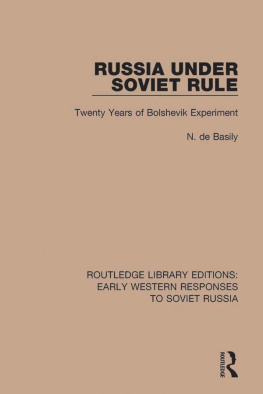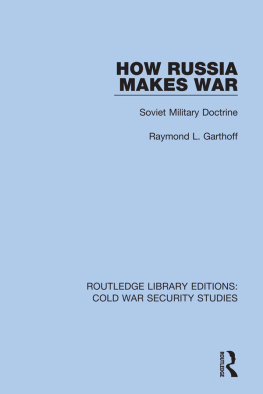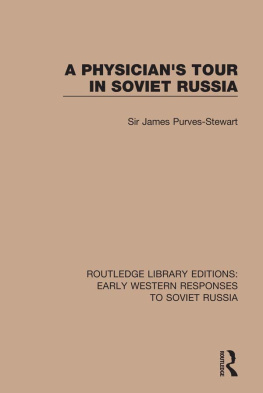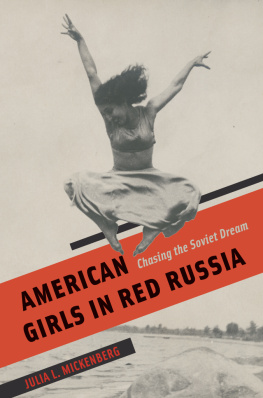By Michael Sayers and Albert E. Kahn
Sabotage!The Secret War Against America
The Plot Against Peace
The Great Conspiracy: The Secret War Against Soviet Russia
Copyright 1946, by Michael Sayers and Albert E. Kahn
All rights reserved, including the right to reproduce this book or portions thereof in any form
First Edition
Published February 1946
Printed in the United States of America
None of the incidents or dialogue in The Great Conspiracy has been invented by the authors. The material has been drawn from various documentary sources which are indicated in the text or listed in the Bibliographical Notes.
Book One: Revolution and Counterrevolution
Chapter 1. The Rise of the Soviet Power
1. Mission to Petrograd
In the midsummer of the fateful year of 1917, as the Russian revolutionary volcano seethed and rumbled, an American named Major Raymond Robins arrived in Petrograd1 on a secret mission of the utmost importance. Officially, he traveled as Assistant Chief of the American Red Cross Division. Unofficially, he was in the service of the Intelligence Division of the United States Army. His secret mission was to help keep Russia in the war against Germany.
1 Petrograd was the capital of Czarist Russia. The city, named after Peter the Great, was originally called St. Petersburg. It was changed to the more Russian form of Petrograd at the outbreak of the First World War. After the Bolshevik revolution, Moscow became the new capital; and in 1924, after Lenin's death, the name of the former capital was changed to Leningrad.
The situation on the Eastern Front was desperate. The ill-led, wretchedly equipped Russian Army had been cut to pieces by the Germans. Shaken by the impact of the war, and rotted from within, the feudal Czarist regime had tottered and fallen. In March, Czar Nicholas II had been forced to abdicate and a Provisional Government had been established. The revolutionary cry of Peace, Bread and Land! swept across the countryside, summing up all the immediate longings and ancient aspirations of the war-weary, famished and dispossessed Russian millions.
Russia's allies Britain, France and the United States feared the collapse of the Russian Army was at hand. At any moment, a million German troops might be suddenly released from the Eastern Front and hurled against the tired Allied forces in the west. Equally alarming was the prospect of Ukrainian wheat, Donets coal, Caucasian oil, and all the other limitless resources of the Russian land falling into the rapacious maw of Imperial Germany.
The Allies were striving desperately to keep Russia in the war at least until American reinforcements reached the Western Front. Major Robins was one of the numerous diplomats, military men and special Intelligence officers who were being hurriedly dispatched to Petrograd to do what they could to keep Russia fighting....
Forty-three years old, a man of boundless energy, extraordinary eloquence and great personal magnetism, with jet-black hair and striking aquiline features, Raymond Robins was a distinguished public figure in the United States. He had given up a successful business career in Chicago to devote himself to philanthropy and social work. In politics, he was a "Roosevelt man." He had played a leading part in the famous "Bull Moose" campaign of 1912, when his hero, Theodore Roosevelt, had tried to get to the White house without the aid of big money or political machines. Robins was a militant liberal, a tireless and colorful crusader for every cause challenging reaction.
"What? Raymond Robins? That uplifter? That Roosevelt-shouter? What's he doing on this mission?" exclaimed Colonel William Boyce Thompson, head of the American Red Cross in Russia, when he heard Robins had been appointed as his chief assistant. Colonel Thompson was a Republican and a standpatter. He had a considerable personal stake in Russian affairs in Russian manganese and copper mines. But Colonel Thompson was also a realistic and clear-headed observer of facts. He had already privately decided that nothing could be achieved by the conservative approach which U.S. State Department officials were adopting toward the turbulent Russian scene.
David Francis, the American Ambassador in Russia that year, was an elderly, opinionated, poker-playing St. Louis banker and former Governor of Missouri. He cut an odd figure in the hectic atmosphere of war-torn, revolutionary Petrograd with his silver hair, his old-fashioned high stiff collars and his black cutaway coat.
"Old Francis," a British diplomat remarked, "doesn't know a Social Revolutionary from a potato!"
But what Ambassador Francis lacked in knowledge of Russian politics he made up for in the strength of his convictions. These he derived mostly from the lurid gossip of the Czarist generals and millionaires who flocked around the American Embassy in Petrograd. Francis was positive that the whole Russian upheaval was the result of a German plot and that all the Russian revolutionaries were foreign agents. At any rate, he thought the whole thing would soon blow over.
On April 21, 1917, Ambassador Francis had confidentially telegraphed the United States Secretary of State, Robert Lansing:
EXTREME SOCIALIST OR ANARCHIST NAMED LENIN MAKING VIOLENT SPEECHES AND THEREBY STRENGTHENING THE GOVERNMENT; DESIGNEDLY GIVING HIM LEEWAY AND WILL REPORT OPPORTUNELY.
But the Russian Revolution, far from subsiding after the overthrow of the Czar, was only just beginning. The Russian Army was breaking up, and nobody in Russia seemed capable of stopping it. Alexander Kerensky, the ambitious Prime Minister of the Provisional Government, toured the Eastern Front making eloquent speeches to the troops, assuring them that "victory, democracy and peace" were just around the corner. Unimpressed, the starved, rebellious Russian soldiers continued to desert by the tens of thousands. In raged, filthy uniforms, they streamed endlessly through the countryside, across the rain-soaked fields and along the rutted roads, into the villages, towns and cities.2
2 For three years the Russian soldiers had fought with great bravery and skill against overwhelming odds. In the early months of the war, at the peak of the German aggression, the Russians had invaded East Prussia, thus drawing off two German army corps and a cavalry division, and giving Joffre the chance to close the breach at the Marne and save Paris. In its rear, the Russian Army had to contend with treason and inefficiency. The Minister of War, Sukhoumlinov, was a traitor, in German pay. The Czar's court swarmed with German agents and notorious Germanophiles headed by the Czarina and her adviser, the sinister priest, Rasputin. The Russian troops were wretchedly equipped. By 1917, the Russian Army had suffered more fatal casualties than Great Britain. France and Italy combined. The losses totaled 2, 762,064 killed, 4,950,000 wounded, 2,500,000 missing.
In the rear, the homecoming Russian soldiers encountered the revolutionary workers and peasant. Everywhere soldiers, workers and peasants were spontaneously forming their own revolutionary committees, or "Soviets" as they called them, and electing deputies to voice their demand for Peace, Bread and Land! at government headquarters in Petrograd....
When Major Raymond Robins reached Petrograd, hungry, desperate masses of people were spread like a great dark tide over the land. The capital swarmed with soldier delegations, straight from the muddy front-line trenches, demanding an end to the war. Bread riots were occurring almost daily. Lenin's Bolshevik Party the organization of the Russian Communists, which had been declared illegal and driven underground by Kerensky was rapidly growing in power and prestige.









